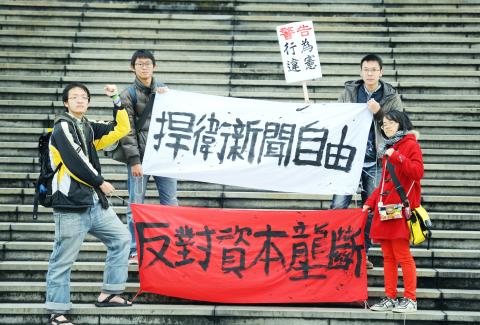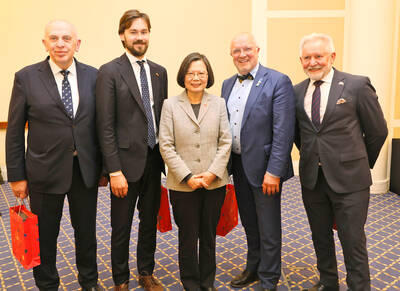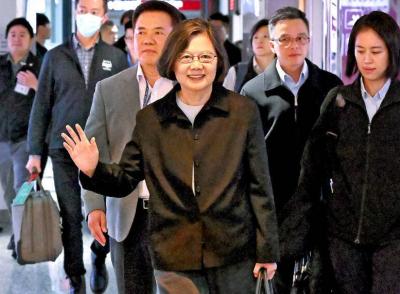“This year, don’t just thank us, but stand with us,” the Youth Alliance Against Media Monsters said in its latest call to raise public awareness about the issue of media monopolization in the nation.
The Want Want China Times Group’s moves to acquire the cable television services owned by China Network Systems and as part of a consortium to purchase the Next Media Group’s Taiwanese media outlets sparked public outrage in the latter half of last year.
Academics, opposition politicians and hundreds of college students expressed concern that the acquisitions could turn the group — which already owns the Chinese-language dailies China Times and Want Daily, the China Times Weekly magazine and television networks CtiTV and China Television — into a “media monster.”

Photo: Lo Pei-der, Taipei Times
The Youth Alliance Against Media Monsters, made up of mostly students, has since staged many protests — demonstrating in front of the CtiTV building, staging an all-night sit-in in front of the Executive Yuan and holding a New Year’s Eve rally at the Liberty Plaza — calling on the government to prevent overconcentration of media ownership in the hands of a few.
Alliance spokesman Lin Fei-fan (林飛帆) said that the alliance’s action is not just any student activism.
“It is an issue that concerns Taiwan. It is something that concerns all of us. The students were only the first ones to act,” Lin said.
In an effort to raise awareness about the severity of the issue, the alliance’s newest campaign slogans employ various analogies to bring the message closer to the public.
“You certainly wouldn’t want the same flavor of braised-pork rice all over Taiwan,” one slogan read.
“If you wanted different types of flavored drinks, what would you do when you find only one brand — the supermarket’s own-label brand — on the shelves?” another said.
National Tsing Hua University student Chen Wei-ting (陳為廷), a member of the alliance, is no stranger to the difficulties in the fight for media independence.
In July last year, the Want Want China Times Group threatened to sue him over an image posted on his Facebook page showing a snapshot of a CtiTV news report of a student protest against the Want Want-China Network Systems merger.
Chen was also the subject of an attack by the Chinese-language United Daily News, which in December devoted a front page and another full page inside to criticizing Chen as being ill-mannered in his criticism of Minister of Education Chiang Wei-ling (蔣偉寧) during a legislative committee meeting.
Aside from fighting against media monopolization, Chen is also one of several students who manage a Facebook page in support of laid-off and incumbent workers in the Hualon Corp labor dispute.
The dispute began about 10 years ago when the textile company’s management asked employees to accept lower salaries, saying the company was suffering because of the financial crisis. The situation worsened in 2011, when the company began to fall into arrears, with some employees being owed months in back wages. The workers were then offered an opportunity to transfer to Fung An Textile Co — another textile company run by Hualon — on the condition they first give up all accumulated annuities for retirement payouts. This angered the workers, who responded by staging protests and strikes, as they called on the government to intervene to protect workers’ rights.
“I’d be lying if I say I have not at times wanted to give up,” Chen said. “However, I must keep fighting because I really care about these issues.”
Youth Alliance spokesman Hung Chung-yen (洪崇晏) said that it is the alliance’s hope that the government would respect human beings.
“It doesn’t matter which case we are fighting for, whether it is the Lo Sheng [Happy Life] Sanatorium, the Wenlin Yuan construction case, the Hualon case or media monopolization. The bottom line is it is the people who face oppression, who are being deprived of power ... and yet they do not have the chance to speak for themselves when they are faced with the government or the media,” Hung said.
The Lo Sheng case stems from a dispute over whether the sanatorium, built in the 1930s to house people with leprosy, should be demolished to give way for the construction of the Xinzhuang MRT Line’s depot.
The Wenlin Yuan case refers to the forced demolition of the Taipei residence of a family surnamed Wang (王). The Wangs maintain that they retain the right to the land and their home, while the Construction and Planning Agency contends that since more than 90 percent of the residents in the area had agreed to the urban renewal project, the Wangs cannot cite the rights of land ownership and usage.
“The act of obtaining freedom is always accompanied by great fanfare and hubbub, but the loss of freedom is always silent,” Lin said, quoting Wang Dan (王丹), an exiled student leader of the 1989 pro-democracy protests in Tiananmen Square in Beijing.
“I have nothing to say about the government, but for our efforts to succeed, we need more people to participate, and to do that we must first instill among the people a sense of civic consciousness,” Lin added.
Speaking of the Youth Alliance’s greatest wish for the New Year, Lin said: “I hope the 70,000 fans on the Youth Alliance’s Facebook page will come out and join us in any future endeavors this year instead of just thanking us on Facebook.”

Former president Tsai Ing-wen (蔡英文) on Monday called for greater cooperation between Taiwan, Lithuania and the EU to counter threats to information security, including attacks on undersea cables and other critical infrastructure. In a speech at Vilnius University in the Lithuanian capital, Tsai highlighted recent incidents in which vital undersea cables — essential for cross-border data transmission — were severed in the Taiwan Strait and the Baltic Sea over the past year. Taiwanese authorities suspect Chinese sabotage in the incidents near Taiwan’s waters, while EU leaders have said Russia is the likely culprit behind similar breaches in the Baltic. “Taiwan and our European

The Taipei District Court sentenced babysitters Liu Tsai-hsuan (劉彩萱) and Liu Jou-lin (劉若琳) to life and 18 years in prison respectively today for causing the death of a one-year-old boy in December 2023. The Taipei District Prosecutors’ Office said that Liu Tsai-hsuan was entrusted with the care of a one-year-old boy, nicknamed Kai Kai (剴剴), in August 2023 by the Child Welfare League Foundation. From Sept. 1 to Dec. 23 that year, she and her sister Liu Jou-lin allegedly committed acts of abuse against the boy, who was rushed to the hospital with severe injuries on Dec. 24, 2023, but did not

LIKE-MINDED COUNTRIES: Despite the threats from outside, Taiwan and Lithuania thrived and developed their economies, former president Tsai Ing-wen said Former president Tsai Ing-wen (蔡英文) on Saturday thanked Lithuania for its support of Taiwan, saying that both countries are united as partners in defending democracy. Speaking at a reception organized by the Lithuania-Taiwan Parliamentary Friendship Group welcoming her on her first visit to the Baltic state, Tsai said that while she was president from 2016 to last year, many Lithuanian “friends” visited Taiwan. “And I told myself I have to be here. I am very happy that I am here, a wonderful country and wonderful people,” Tsai said. Taiwan and Lithuania are in similar situations as both are neighbors to authoritarian countries, she

Former president Tsai Ing-wen (蔡英文) is to visit the UK during her ongoing European trip, which originally included only Lithuania and Denmark, her office said today. Tsai departed Taiwan for Europe on Friday night, with planned stops in Lithuania and Denmark, marking her second visit to the continent since her two-term presidency ended in May last year. Her office issued a statement today saying that Tsai would also visit the UK "for a few days," during which she is to meet with UK politicians and Taiwanese professionals, and visit academic and research institutions. Following Tsai's stop in Denmark, she is to visit the